Brexit Brief Newsletter
Monday 26 April 2021

Welcome to the 26 April 2021 newsletter
The results of polls for the BBC and Queen’s University, which include matters relating to the Protocol on Ireland/Northern Ireland, have been published. The European Parliament will vote on the EU-UK Trade and Cooperation Agreement tomorrow. UK Parliamentary and NI Assembly Committees continue their inquiries relating to the Protocol, while North-South and East-West cooperation has been the subject of discussion.
Polls reveal current attitudes to the Protocol
The results of a LucidTalk poll on behalf of Queen’s University Belfast(QUB) were published on 21 April, as part of its project entitled ‘Governance for 'a place between’: the Multilevel Dynamics of Implementing the Protocol on Ireland/Northern Ireland’.
The poll was carried out between 24-28 March, ahead of the recent unrest in Belfast and elsewhere. Participants were surveyed on their attitude to Brexit and the Protocol on Ireland/Northern Ireland, as well as how they would wish their MLAs to vote on the ‘democratic consent mechanism’ which is to be held at the end of 2024. The poll finds that 37% think that Brexit is a good thing for the UK, 57% disagree with this. Asked whether the Protocol “provides appropriate means for managing the effects of Brexit on Northern Ireland”, 46% of respondents agree that it does, while 42% disagree.
Participants were asked about trust in various actors to manage the Protocol: only 5% of respondents said they have trust in the UK to manage the effects of the Protocol, while 15% trust the NI Executive on the matter. Business representatives are trusted or trusted a lot by 52% of respondents.
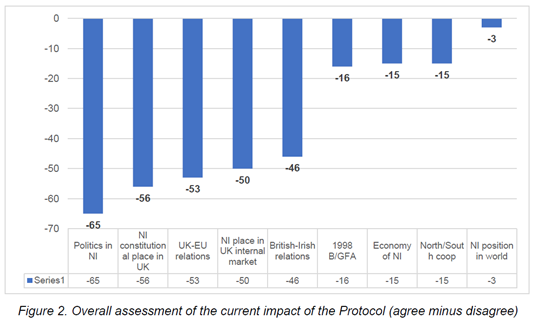
Source: Queen’s University Belfast
Professor David Phinnemore of QUB said, “This poll shows us that the Protocol is a live and contested issue among voters as well as political parties in Northern Ireland.” He argues that, “The political debate in Northern Ireland in the lead-up to the Assembly elections in May next year could very well centre upon the Protocol.”
Queen’s will be conducting surveys on public opinion on matters relating to the Protocol every four months. The project can be followed on Twitter at @PostBrexitGovNIand on the website.
The BBC also conducted polling on related questions as part of its Spotlight programme on the centenary of Northern Ireland. This poll was carried out over the Easter period which saw violence in several areas across Northern Ireland. It found of 48% of those surveyed in Northern Ireland want the Protocol to be removed, while 46% think the Protocol should be retained. Spotlight interviewed the Prime Minister who said he was working to “sandpaper” away the “unnecessary protuberances and barriers” to trade across the Irish Sea. You can see the full results of the poll on LucidTalk.
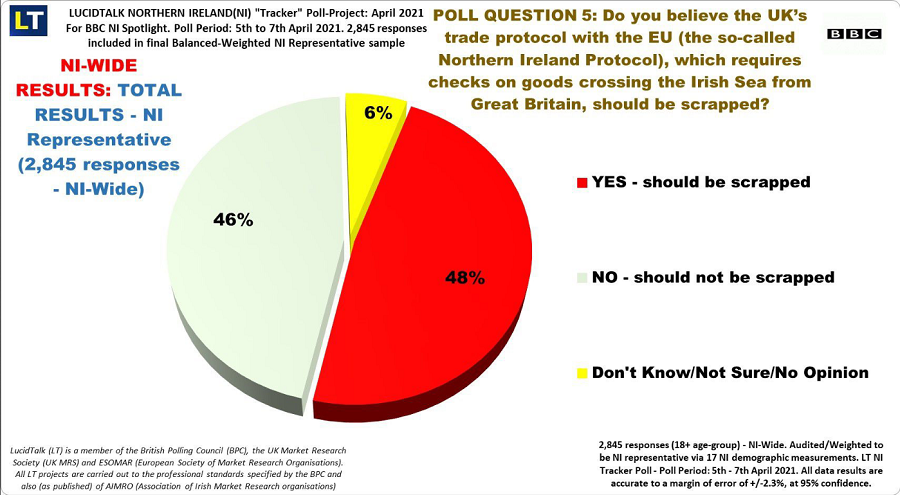
NI attitudes to the Protocol | Source: LucidTalk
Johnson urged to act
Meanwhile, four former secretaries of state for Northern Ireland, as well as other notable figures with experience in Northern Ireland, have written to the Prime Minister Boris Johnson, warning him that “action is needed now” and that “the prime minister and the secretary of state must urgently create the space for local politics to regain the initiative.”
Former Secretaries of State Peter Hain, Peter Mandelson, Paul Murphy, and Shaun Woodward are among the signatories, as well as Sir Hugh Orde, a former chief constable of the Police Service of Northern Ireland, Lord Robin Eames, Former Archbishop of Armagh. The letter states that “There is a strong sense within loyalist and unionist communities that no one is listening to them, and that nobody in authority in Whitehall has been honest with them about the consequences of Brexit… As a matter of urgency, the government must address the outworking of the protocol with Brussels.”
European Parliament to vote on the Trade and Cooperation Agreement
The European Parliament is set to debate and vote on the EU-UK Trade and Cooperation Agreement tomorrow (Tuesday 27th April). Bernd Lange, chair of the Parliament’s International Trade Committee, said that EU-UK negotiations regarding Northern Ireland “are on track and solution[sic] in sight”, adding that “agreement gives additional instruments to act against misbehaviour of the partner”.
The European Parliament resolution on the outcome of EU-UK negotiations calls on the UK Government “to act in good faith and fully implement the terms of the agreements which it has signed”, and calls on the European Commission “to pursue with vigour the infringement proceeding against the UK launched on 15 March 2021.” It also highlights “the role given to the Northern Ireland Assembly in the Protocol…[and] expresses the need for ongoing and enhanced dialogue between political representatives and civil society, including with Northern Ireland representatives, on all aspects of the Protocol on Ireland/Northern Ireland and the broader Northern Irish peace process”. It welcomes the UK’s continued participation in Horizon Europe and the EU funding for the PEACE+ programme for Northern Ireland, while expressing regret about the UK’s decision not to partake in the Erasmus+ scheme.
Irish MEPS have been encouraged by Minister for Foreign Affairs Simon Coveney to support the agreement.
North-South cooperation
In the Assembly on Monday 19th April, First Minister Arlene Foster was asked about the recent transport meeting of the North-South Ministerial Council(NSMC), which was unable to go ahead. The North-South Ministerial Council is one of the bodies which feeds into the governance structures of the Protocol. North-South meetings must take place with both a unionist and nationalist representative. Infrastructure Minister Nicola Mallon (SDLP) said the transport meeting could not go ahead because a unionist minister had not been nominated. Mallon said, “The DUP's obstruction is a deliberate act to undermine the Good Friday Agreement. Their tactic of disruption and delay isn’t going to work.”
Foster was asked by John O’Dowd (Sinn Féin) to give her assurance that the DUP will not use North-South cooperation in its campaign against the Protocol on Ireland/Northern Ireland. Foster said, “the Northern Ireland protocol is not part of the North/South Ministerial Council. As we outlined some weeks ago, North/South relationships will be affected by the fact that the protocol is in place, because it has damaged east-west relationships. We need to sort it out.” She said the reason that the meeting did not proceed was because “it did not suit the nominated person who would accompany her and that the agenda and papers had not been agreed by my office”.
On 21 April, the NSMC Trade and Business Development meeting took place, attended by Minister for the Economy Diane Dodds MLA (DUP) and Minister of Finance Conor Murphy (Sinn Féin). They met with Tánaiste Leo Varadkar TD. Murphy welcomed the fact that the meeting had taken place, saying, “North-South cooperation between the Irish Government and the Executive is a central part of the Good Friday Agreement.” The statement published following the meeting welcomes the achievements of InterTradeIreland, but does not mention Brexit or the Protocol.
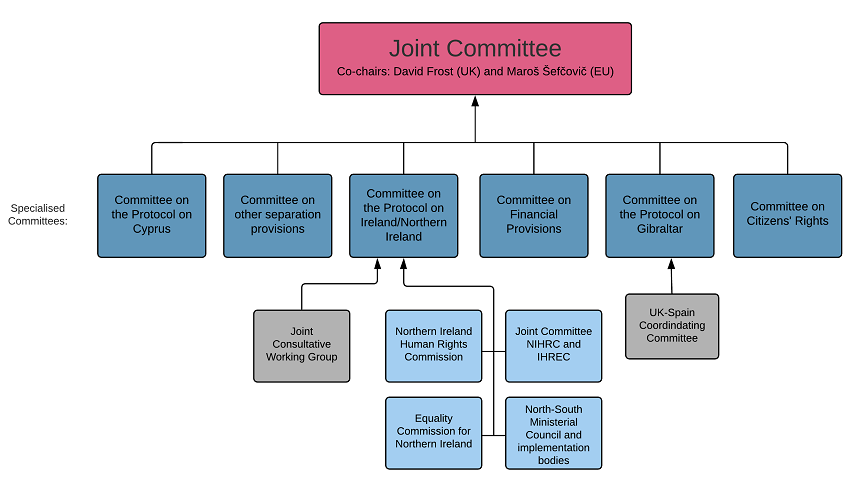
Governance structures of the Withdrawal Agreement and Protocol on Ireland/Northern Ireland
The next sectoral meeting of NSMC concerns agriculture and is set to take place on 28 April. It is expected that the Executive will be represented by Agriculture Minister Edwin Poots (DUP), and Nichola Mallon(SDLP) who are due to meet Irish Minister for Agriculture Charlie McConalogue.
The Centre for Cross Border Studies has presented the results of its survey on the conditions for North-South and East-West cooperation after Brexit. The report concludes that “political, social, regulatory, and material contexts are broadly perceived as deteriorating for North-South and East-West contact and collaboration”. It cites Brexit and Covid as the biggest obstacles to cross-border collaboration.
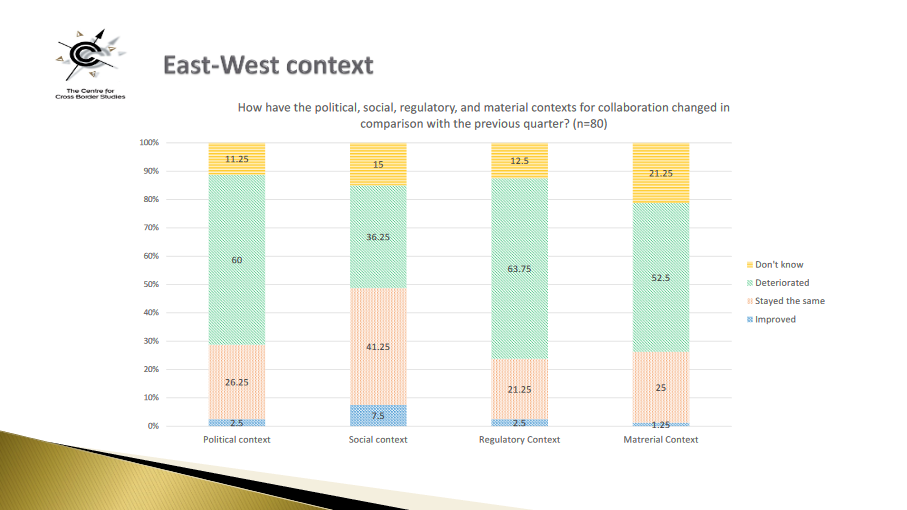
Assessment of East-West cooperation | Source: Centre for Cross Border Studies
Withdrawal of staff from ports
The Committee for Agriculture, Environment and Rural Affairs continues its inquiry into the withdrawal of DAERA and Local Authority Staff from ports. On Thursday, members quizzed the Chief Executive of Mid and East Antrim Borough Council Anne Donaghy and Mayor Peter Johnston over its decision to stand down staff. Staff were reinstated after the PSNI’s threat assessment concluded that there was no evidence of a credible threat to staff. Briefing papers which the Committee has received on the matter from the Council, as well as from the Department for Agriculture, Environment and Rural Affairs, the Police Service of Northern Ireland, and trade unions can be found here.
Donaghy outlined the factors leading to the decision to temporarily withdraw their Council staff from Larne port, including threatening messages in graffiti, media coverage around this, tensions around border control posts which “served to heighten concerns among council staff and elected members”, and evidence given to the Northern Ireland Affairs Committee of the House of Commons by the PSNI Assistant Chief Constable around “growing discontent” in certain communities.
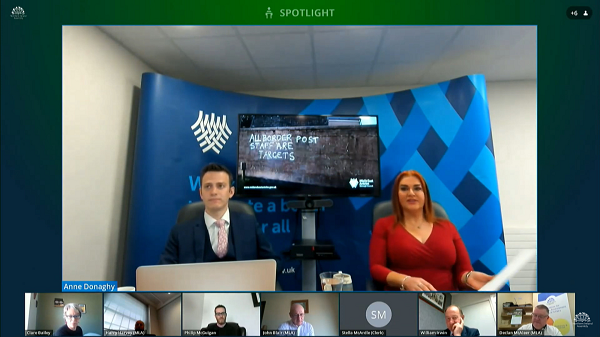
Donaghy and Johnston giving evidence to the Committee | Source: NI Assembly
Johnston said the matter has been “shamefully mistreated, manipulated and exploited as political football by certain parties”. He said that the Council “stands firm” over its action and would take “exactly the same action” in the same circumstances.
A letter from the Mid and East Antrim Council to the UK Cabinet Office was raised. Donaghy said she wrote the letter as a representative of SOLACE (Society of Local Authority Chief Executives) and that the letter is “nothing to do” with the decision which was made and is “outside of the inquiry”. The letter, which highlights security concerns relating to the Protocol, as well as “Union connectivity”, has subsequently been leaked.
Trader Support Service evidence session
On 21 April, the Commons Northern Ireland Affairs Committee heard evidence from the Trader Support Service (TSS). The TSS, which is free to use, was established by the UK Government to support GB-NI trade in goods following the end of the transition period. It helps businesses with the new requirements associated with the Protocol on Ireland/Northern Ireland. Since 21 January TSS has assisted 139,000 reported goods movements GB-NI, involving 439,000 consignments, 360,000 SFD consignments and 224,000 Supplementary Declarations.
Shanker Singham, Senior Member of the Trader Support Service Consortium, said that a veterinary agreement, such as the agreement New Zealand has with the EU, would be “really helpful”. He said it would “lower the intensity of physical checks”: “You would not take away the need for the actual process, but you would make it easier”. Singham said their goal is to “make life the least burdensome it can be, consistent with the legal requirements we are bound by as TSS.” He encouraged traders and constituents who have problems with the system to get in touch with the organisation.
Other news
- The High Court has refused permission for the Welsh Government Counsel General to apply for judicial review of the Internal Market Act and its impact on devolved powers stating, “this claim for judicial review is premature.” On 19 January the Counsel General and Minister for European Transition Jeremy Miles launched the proceedings on the grounds that “the Act impermissibly, impliedly repeals parts of the Government of Wales Act 2006 in a way that diminishes the Senedd’s legislative competence and that the Act confers power on the UK Government, by way of wide Henry VIII powers, which could be used by UK Ministers to substantively amend the Government of Wales Act in a way that cuts down the devolution settlement.”
- The General Affairs Council met in Brussels on 20 April. The meeting is attended by European Affairs Ministers from the 27 EU member states. EU-UK relations was on the agenda, in light of recent events including the UK’s decision to unilaterally extend grace periods for the Protocol, and subsequent legal action by the EU. Following the meeting European Commission Vice President Maroš Šefčovič said they want to “minimise the disruption” for the people of Northern Ireland, but “it has to do a two-way street…I am sure the UK can do more.” He said the checks could be smoother and many controls could be removed if there was an agreement on SPS controls.
- Last week in the Assembly, Caoimhe Archibald (Sinn Féin) proposed a motion on card fees in relation to Brexit. The motion “regrets the decision of Visa and MasterCard to increase, drastically, their fees for EU card transactions; notes that these increases are possible only because of Brexit and the subsequent loss of EU consumer protections”. She said since the end of the transition period, “MasterCard announced that it would hike by 500% the transaction fees on UK-issued cards making purchases from EU-based companies”. An Alliance party amendment was made which “calls on the UK Government to engage with the European Union to reach an agreement on interchange fee caps on UK-EU and EU-UK card transactions as part of wider efforts to ease the trading frictions caused by Brexit”. The amendment and motion were passed.
- RTÉ reports on the Irish Government’s work in relation to the Conference on the Future of Europe, which will begin on 9 May and aims to reform the European Union. It reports on an Irish Government memo which states that it will “involve citizens in Northern Ireland as part of a national dialogue on how the EU should be reformed”.
This Week at the Assembly
- Wednesday 28 April, 2pm – Committee for The Executive Office - UK Exit from EU - Oral evidence session with junior Ministers on Brexit Issues
- Thursday 29 April, 10am - Committee for Agriculture, Environment and Rural Affairs - Withdrawal of DAERA and Local Authority Staff from Ports - Belfast City Council & Newry, Mourne, and Down District Council; Written Briefing from DAERA - EU Transition Update
- Thursday 29 April, 2.30pm – Ad Hoc Committee on a Bill of Rights - Briefing by NIHRC and the Equality Commission: Implications of Brexit for Human Rights
Catch up with the Committees
- Monday 19 April, 12pm – Plenary - Question Time: The Executive Office; Private Members' Business - Brexit and Card Fees
- Wednesday 21 April 3.15pm - Committee for Finance - RaISe Oral Presentation - UK Internal Market Act 2020
- Thursday 22 April, 9.35pm – Committee for Agriculture, Environment and Rural Affairs - Oral Evidence from Mid and East Antrim Borough Council - Withdrawal of DAERA and Local Authority Staff from Ports; Written Briefing from DAERA - EU Transition Update



